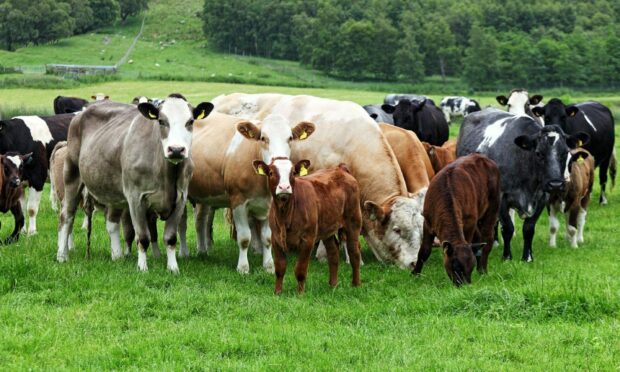Greenhouse gas emissions from UK livestock farms could be reduced by 23% if wide-scale mitigation measures are adopted by industry, claims a new report.
The study, published by the Centre for Innovation Excellence in Livestock (CIEL), was compiled by scientists from various agricultural institutes including Scotland’s Rural College (SRUC) and the Agri-Food and Biosciences Institute (AFBI).
It looked at a wide range of measures which could be adopted on dairy, beef, sheep, pig and poultry farms to reduce greenhouse gas and ammonia emissions.
These included steps to improve production efficiency – such as reducing the age female animals first breed and improving growth rates – and the use of new technologies such as rumen methane inhibitors.
The report found a 23% reduction in greenhouse gas emissions, as well as a 15% reduction in ammonia emissions, could be achieved if mitigation measures were adopted rapidly and on a wide-scale by UK farmers.
Substantial change needed to meet targets
CIEL head of innovation, Mark Young, said the report highlighted that substantial change was needed if the UK livestock industry was to achieve its net-zero targets.
“The need for improvement in herd or flock production efficiency should be the focus for most farmers in the drive to reduce their carbon footprint, and this report highlights that need,” said Mr Young.
“Increasing productivity per animal while reducing input costs, and maintaining overall productivity at the same level, is something we can do right now.
“Farmers can focus on aspects such as age at which females first breed and their productive lifespan; number of offspring produced and their growth rate; and rate of milk or egg production.”
He said new technologies could also be used to help farmers reduce their emissions, and the study assessed the impact of rumen methane inhibitors on dairy, beef and sheep farms.
“The assumed efficacy of this technology could be considered high and therefore work is ongoing to help bring these technologies to market and develop delivery mechanisms that are better suited to grazing systems and less dependent on concentrate feeding,” added Mr Young.
Effort required from industry
CIEL chief executive officer, Lyndsay Chapman, said steps to make changes on farms to reduce their emissions required collective effort from everyone involved in the industry.
She said: “Farmers cannot, and should not, be expected to deliver this on their own.
“This report re-confirms that we could deliver a large reduction in greenhouse gases to significantly contribute to the goal of net zero carbon by 2050, but even that requires universal adoption of the various known mitigations across all livestock farms in the UK – something we are not currently achieving.”
Ms Chapman added: “This emphasises the critical need for new innovations and for change to be rapid and widespread, actively supporting adoption of both known and new mitigations.”
The report can be accessed online at www.cielivestock.co.uk

